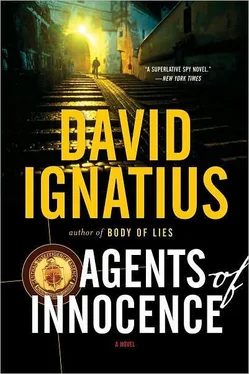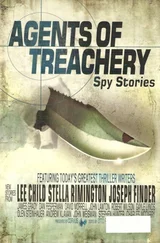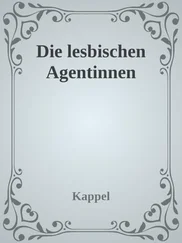David Ignatius - Agents of Innocence
Здесь есть возможность читать онлайн «David Ignatius - Agents of Innocence» весь текст электронной книги совершенно бесплатно (целиком полную версию без сокращений). В некоторых случаях можно слушать аудио, скачать через торрент в формате fb2 и присутствует краткое содержание. Жанр: Шпионский детектив, на английском языке. Описание произведения, (предисловие) а так же отзывы посетителей доступны на портале библиотеки ЛибКат.
- Название:Agents of Innocence
- Автор:
- Жанр:
- Год:неизвестен
- ISBN:нет данных
- Рейтинг книги:3 / 5. Голосов: 1
-
Избранное:Добавить в избранное
- Отзывы:
-
Ваша оценка:
- 60
- 1
- 2
- 3
- 4
- 5
Agents of Innocence: краткое содержание, описание и аннотация
Предлагаем к чтению аннотацию, описание, краткое содержание или предисловие (зависит от того, что написал сам автор книги «Agents of Innocence»). Если вы не нашли необходимую информацию о книге — напишите в комментариях, мы постараемся отыскать её.
Agents of Innocence — читать онлайн бесплатно полную книгу (весь текст) целиком
Ниже представлен текст книги, разбитый по страницам. Система сохранения места последней прочитанной страницы, позволяет с удобством читать онлайн бесплатно книгу «Agents of Innocence», без необходимости каждый раз заново искать на чём Вы остановились. Поставьте закладку, и сможете в любой момент перейти на страницу, на которой закончили чтение.
Интервал:
Закладка:
The military pretensions of the guerrillas were quickly demolished. The Jordanian Army captured the Fatah headquarters on Nasser Square in minutes. The Old Man fled deeper into Jebel Hussein, then to the hilltop of Ashrafiyeh. In the first hours, the Fatah leader spent his time frantically calling his Jordanian political contacts to try to arrange a cease-fire. Fatah had no battle plan, no secure headquarters, no reliable communications other than open radio transmissions.
The one-sided battle lasted barely more than a week. It ended when the Old Man ignominiously slipped out of Amman, disguised in Bedouin robes as a member of a Kuwaiti mediating delegation. The Jordanians continued for more than a year mopping up what was left of the resistance until they eventually slaughtered the last band of die-hard fighters who had remained in the woods near Jerash and Ajlun in northern Jordan.
The Old Man had believed nearly to the end that he would win in Jordan. His folly was documented in stacks of handwritten memos and documents that were captured by the king’s Bedouin troops during the Battle of Amman.
It was a touching collection. A hand-drawn plan of Basman Palace, roughly sketched as if by a child, showing how the fedayeen could attack the Hashemite monarch in his chambers. A crude map showing how to attack a Jordanian military encampment on a road between Amman and Salt. Another rough sketch showing how to penetrate Jordanian barbed wire. Lists that endlessly detailed the responsibilities of various chiefs and subalterns in this most bureaucratic revolution. Handwritten notes from the Old Man himself that showed him scheming, double-dealing, manipulating, and playing politics-assuring the king all the while that the fedayeen hadn’t any designs on his throne.
After it was all over, the king gathered the most incriminating documents into a simple booklet called The Activities of the Fedayeen in Jordan, 1970. The booklet was printed only in Arabic and was never distributed in the West. But the king sent a copy to each of the twenty-one Arab heads of state. It was a catalogue of the Old Man’s perfidy and helped explain why, for years after, the other Arab leaders paid lip service to the Palestinian cause but didn’t fully trust the PLO chairman.
“Black September,” as the dazed Palestinians called the events in Jordan, seemed at first like a finale, but it was really only a prelude. It was a hurricane, which swept through the cracks and crevices of the Arab political world and left the foundations weak and vulnerable. One of the Fatah leaders who supervised the Rasd’s intelligence activities wrote later of a warning that he secretly transmitted to the Jordanian king after the events of Black September:
“If you strike the fedayeen in their last holdouts in Jerash and Ajlun, I’ll follow you to the end of the earth, to my dying breath, to give you the punishment you deserve.”
It must have sounded like a vain and idle threat. But it was the beginning of a nightmare that took the codename “Black September.”
25
Beirut; Fall 1970
Hoffman came into the office the morning after the Lebanese election waving a copy of An Nahar, the leading Beirut newspaper. A banner headline across the top of the page proclaimed: “The Voice of the People Has Spoken.” Beneath it was a front-page editorial, lauding the victory of the new president, who had been elected by parliament the previous day by one vote.
“Can you believe these assholes?” said Hoffman to his four senior officers as they sat down in the conference room for one of their infrequent staff meetings. Hoffman was in a bad mood: red-faced, mean-tempered, a menace to anyone unlucky enough to get in his way. He brandished the newspaper at Rogers.
“The guy wins by one fucking vote and they’re calling it the voice of the people!” said Hoffman. “Imagine what they would be saying if he had won by two votes.”
“Sore loser?” asked Rogers.
“Hell, yes,” said Hoffman. “It cost us plenty to buy the old gang of thugs. Now we’ve got to start all over again.”
“It’s a bit more complicated than that, chief,” said the station’s senior political analyst. He was a beady-eyed man who looked as though he should be wearing a green eyeshade.
“No doubt,” said Hoffman. “Everything seems to be more complicated than I think it is. All I want to know is who won and who lost.”
“That’s just the problem,” said the analyst. “It’s very hard to tell. The old political establishment has been swept out of office, to be sure. But that doesn’t mean there are clear winners and losers. The Sunni Moslems might seem to have won, since the new president has the support of most of the Sunni leadership. But the new president also has the support of some of the Christian militia leaders who were being squeezed by the old regime. So you see, it’s really rather complicated.”
“Bullshit,” said Hoffman.
“May I suggest the real problem with this election?” ventured Rogers.
“Oh please,” said Hoffman. “Absolutely. By all means.”
“The real problem with this election was that both sides couldn’t lose.”
Hoffman tilted his head, squinted his eyes at Rogers, smiled with elaborate politeness, and silently clapped his hands. Rogers looked at the round-faced station chief. Sitting in his comfortable, overstuffed leather desk chair, he looked like Humpty-Dumpty.
“Now then, boys and girls,” said Hoffman. “Since you’re all such political experts, perhaps you can help the United States government figure out where we stand with the new leaders of this miserable excuse for a country.”
There was silence.
“Any volunteers?”
“Yes, sir,” spoke up a new member of the station named York Harding. He had arrived in Beirut two months earlier, following a stint in Vietnam, and he wore his hair in a crew cut. York Harding was what grade schoolers call an “eager beaver.”
“Yes, Mr. Harding,” said Hoffman.
“The election of the new president offers us a real opportunity for political action…”
“The election of the Squirrel,” interjected Hoffman.
“The Squirrel?” queried Harding, totally mystified.
“That’s what I call the new president, Mr. Harding. And do you know why?”
“No, sir,” said Harding.
“Because he looks like one, you idiot! He’s a furry little bastard whose cheeks always look like they’re full of nuts. Don’t you agree?”
“Yes, sir.”
“Sorry I interrupted you, Mr. Harding. Pray, continue.”
“I think the election of, uh, the Squirrel gives us a new opportunity to find a middle ground in Lebanon. A third force, between the Christians and the Moslems.”
“A third force, eh?” said Hoffman, stroking his chin.
“Yes, sir.”
“How long were you in Vietnam, son?” asked the station chief.
“Eighteen months, sir,” said Harding.
“And you were a political action officer out in the countryside. Teaching the peasants about farming and medicine and self-government, and maybe a little throat-slitting on the side. Am I right, Harding?”
“Yes, sir.”
“Well, spare me your Vietnam bullshit, will you, Mr. Harding? We may have problems here in Lebanon. But we are not yet at the total monumental fuck-up stage. You get me?”
“Yes, sir,” said Harding.
“And if I ever hear the words ‘third force’ again, I’m going to throw you out the window.”
“Yes, sir.”
“And don’t call me ‘sir,’ you cross-eyed little son of a bitch.”
Rogers looked at Harding. The young case officer’s eyes were moist. Rogers decided it was time to draw the bull away before he further wounded his young prey.
“Chief,” said Rogers, “I think Harding has a point. There are opportunities created by the election of a new president. Let’s face it. The incumbents were running a glorified police state. The country was under the thumb of the Deuxieme Bureau, which made life easy for us. But the Lebanese, evidently, got sick of it.”
Читать дальшеИнтервал:
Закладка:
Похожие книги на «Agents of Innocence»
Представляем Вашему вниманию похожие книги на «Agents of Innocence» списком для выбора. Мы отобрали схожую по названию и смыслу литературу в надежде предоставить читателям больше вариантов отыскать новые, интересные, ещё непрочитанные произведения.
Обсуждение, отзывы о книге «Agents of Innocence» и просто собственные мнения читателей. Оставьте ваши комментарии, напишите, что Вы думаете о произведении, его смысле или главных героях. Укажите что конкретно понравилось, а что нет, и почему Вы так считаете.












